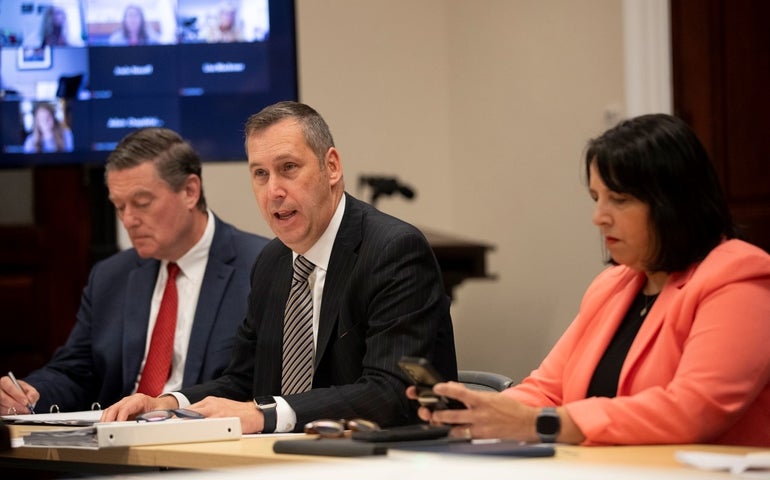Gov. Maura Healey will file her plan to close the books on fiscal year 2023 — and address a tax revenue shortfall previously forecast to be tens of millions of dollars — in the “next day or two,” her budget chief said Tuesday.
Administration and Finance Secretary Matthew Gorzkowicz told local officials that the annual spending bill to wrap up the fiscal year that ended June 30, often referred to as a “closeout” supplemental budget, will emerge later this week.
He did not provide many details about the inbound proposal during a Local Government Advisory Commission meeting, and told reporters afterward that “the budget’s in balance” even though state tax collections in FY23 landed about $605 million below the most recent projections.
“What we had tracked as part of the shortfall for tax revenue is offset by other revenues we see in departmental revenues, federal reimbursements, and other things that help bring our balance sheet together,” Gorzkowicz said, adding that the closeout bill will propose “some additional spending.”
Most of the tax revenue slowdown came from capital gains tax collections, which must be deposited into the state savings after they hit a certain threshold. As a result, the shortfall does not translate directly into a budget hole of equal size.
The Healey administration estimated last month that the tax revenue gap could be $39 million or $177 million, depending on how officials decide to use about $138 million in revenue stuck in a bit of a legal gray area from the new 4 percent income surtax on household income above $1 million.
Beacon Hill budget-writers originally projected collecting enough excess capital gains tax revenue to deposit about $1.5 billion into the state’s “rainy day” stabilization fund, but the actual deposit was half that size, pushing the total balance in that savings account to roughly $8 billion.
Gorzkowicz said there was no need for “any emergency spending reduction” or rainy day fund withdrawals, but he did not elaborate on how the forthcoming closeout budget will address any tax revenue gap.
Through the first two months of fiscal 2024, tax collections are running $21 million or 0.4 percent short of projections. Gorzkowicz told local officials that July and August are “relatively small” months for tax revenue, suggesting the pace so far might not be indicative of a larger trend.
“We feel pretty comfortable about where we are with our consensus revenue number,” he said. “Obviously, it’s a relatively smaller month, so the year-over-year decrease is not something we’re concerned with at this point.”
Interest groups across the spectrum have been peppering lawmakers with competing arguments over how the state’s financial footing should affect long-stalled talks about tax relief.
While tax revenues have slowed from record highs, they remain elevated compared to previous years. State government also faces major unexpected costs, including an emergency shelter crisis that’s costing at least $45 million per month, and might wind up on the hook for additional expenditures after the discovery that Massachusetts erroneously paid $2.5 billion in jobless benefits during the pandemic with federal funds instead of state money.
Gorzkowicz said the tax relief bill Healey filed in March, which carried an annual impact of nearly $1 billion, “remains sound, reasonable and affordable fiscal policy that is [as] urgent as ever to ensure the long-term stability of our economy and tax base.”
The closeout supp budget is not the only major legislation a member of Healey’s Cabinet forecast during Tuesday’s meeting: Housing Secretary Ed Augustus said a housing bond bill is also in the works.
Lawmakers and former Gov. Charlie Baker agreed in 2018 on a five-year, $1.8 billion housing bond bill to distribute money to a range of housing investments, and advocates have cautioned that money is running out.
Augustus said the state needs to “recapitalize the programs that we use to support housing production [and] public housing infrastructure.”
The governor is also under pressure to produce some proposals to address the state’s shortage of housing inventory and to help ease the burden of housing costs.
“We’re going to be looking for that to be an opportunity to also do some policy recommendations and other things that we think will help try and meet the moment in terms of the housing challenges that we’re facing here in the commonwealth, the shortage of units,” Augustus told the LGAC.
Housing advocates hope Healey includes in her bill some form of a controversial transfer free on real estate transactions. Supporters say cities and towns should have the fee option available to raise money for affordable housing, while opponents say the fee will just making housing more expensive.

